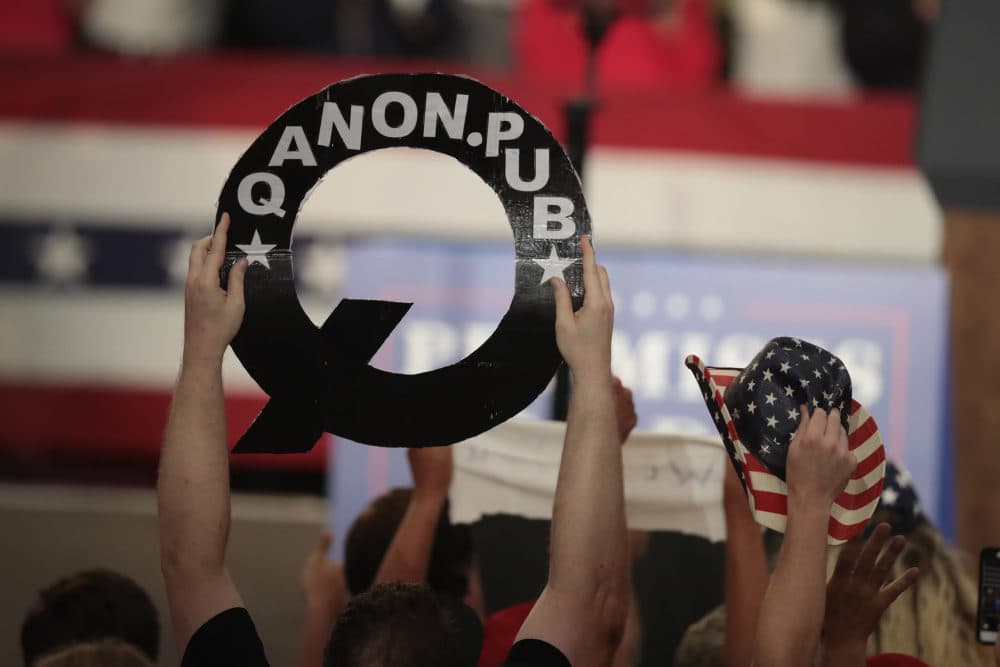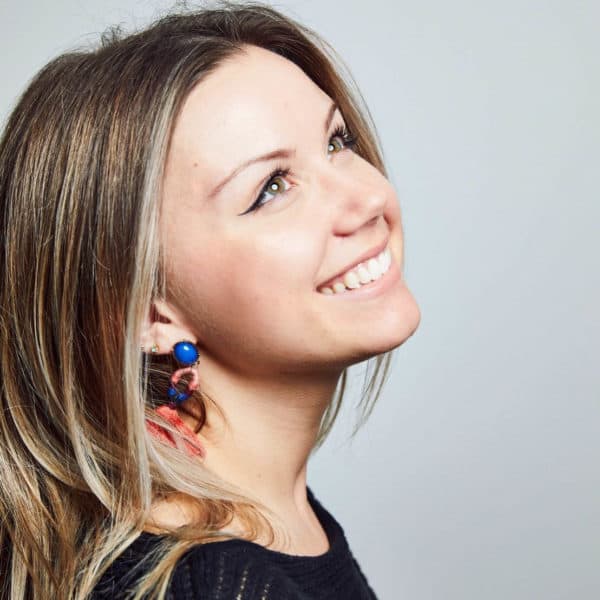Advertisement
What Is QAnon?

At least 14 Republican candidates with links to QAnon have made their way into runoffs or onto the ballot this November.
QAnon is a far-right conspiracy theory and loosely organized network centered around the belief that the U.S. is controlled by a cabal of child sex trafficking, Democratic elites hell-bent on bringing down President Trump.
Followers believe these elites, led by Dr. Anthony Fauci, have gone so far as to manufacture the coronavirus to bring Trump down. They heed cryptic online dispatches of someone named Q who's anonymous — hence QAnon — who claims the highest government security clearance.
QAnon adherence includes people young and old of many backgrounds who try to push their “deep state” narrative into the mainstream. They show up at Trump rallies in Q merchandise, shirts and hats. President Trump has retweeted Q-supporting accounts many times — including at least 90 times since the pandemic began, says Alex Kaplan of Media Matters.
The group grew out of Pizzagate, the conspiracy theory chinned up in large part by Alex Jones, that falsely claimed Hillary Clinton was running a child sex trafficking ring out of a Washington, D.C. pizza parlor. This so enraged one man that he picked up his assault rifle, stormed the restaurant, searching for children who were not there.
QAnon started on 4Chan, a message board website “well known for hosting white nationalists and white supremacists,” Kaplan says.
In late 2017, someone claiming to have Q clearance in the government began dishing what they claimed to be an inside scoop on President Trump working with then special counsel Robert Mueller to expose Trump’s enemies in the deep state, Kaplan explains. These enemies included a ring of sex traffickers and pedophiles around the globe.
QAnon has crafted conspiracy theories ranging from outrageous to dangerous — so much so that the FBI considers the loosely-tied group as extremists capable of carrying out violent attacks.
They’ve been linked to multiple violent incidents, Kaplan says. A vocal Q supporter, a man from Arizona, pleaded guilty to terrorism charges in February after he blockaded the Hoover Dam with an armored vehicle. Within his truck, he had multiple assault-style rifles and handguns, plus 900 rounds of ammunition.
Advertisement
Kaplan also says there have been attempted kidnappings linked to Q followers, such as a Colorado woman who was arrested and charged with conspiracy to commit second-degree kidnapping.
QAnon’s influence is growing as the fringe conspiracy group picked up speed this summer — there have been 10 times as many Google searches for the group in July compared to January and Axios reports a 190% increase in the daily average number of tweets including QAnon hashtags since March compared to months prior.
The coronavirus plays a large role in the uptick, Kaplan says. With more people online as a result of quarantine, people have more time to go down rabbit holes on the internet.
“At the same time, I think maybe some people, as a result of the pandemic, are feeling frustrated, worried, scared, want answers,” he says. “They want to try to make sense of what's going on and that may be leading them to QAnon as well.”
Plus, powerful people within Trump’s orbit have both intentionally or unintentionally promoted them, he says. For example, Trump’s social media advisor Dan Scavino posted on Facebook a picture with a Q in it. Kaplan says he was able to find that Scavino got the photo from a QAnon supporter on the social media platform.
“Eric Trump, Trump's son, recently posted on Instagram a QAnon graphic, which he then took down without any explanation,” he says. “It was a clear QAnon graphic.”
During a recent Fox News interview, the union chief of the New York Police Department's second-largest police union had a QAnon mug placed in the background. And in another instance, a SWAT official outfitted with a Q patch on his vest greeted Vice President Mike Pence on the tarmac in Florida.
Q and others in the collective make it clear they believe the news media is false. Kaplan says they often use the phrase “we are the news now” and claim “they're identifying what's really going on as opposed to the media lying to you,” he says.
Similar to many evangelicals, QAnon supports seem to believe the world is on the cusp of a great awakening. Adrian Hon, a game designer, says QAnon reminds him of an immersive multiplayer game and he's worried people could recreate the playbook.
Kaplan says people have compared QAnon to larping — a real-life role-playing game — because the group “puts what's going on, in some ways, in your hands.”
“You can do the research, you can feel involved, you feel like you can explain and figure out what's really going on behind the scenes and can make sense of ... what seems like chaos going around the world,” he says.
Some newsrooms don’t want to draw attention to Republican congressional candidates who dabble with QAnon and therefore inflate conspiracy theories.
But Kaplan argues these stances from candidates — no matter their spectrum of adherence to the movement — “absolutely” need to be front and center. Candidates for office need to be questioned on their beliefs in a group that has been flagged by the FBI, linked to violence and sparked numerous misinformation campaigns, he says, because it “raises red flags” about their judgment.
Jeffrey Epstein’s case has come into view as proof that young women are being trafficked by high-profile people. Epstein was a convicted sex offender who sexually abused girls as young as 14 years old.
But Donald Trump, an icon within QAnon, was friends with Epstein, even seen photographed together at different events. Kaplan says the group is selective in some ways but notes that Q has mentioned Epstein multiple times to try to connect the dots between Democrats and global sex trafficking.
“What happened with Epstein does not mean QAnon is true,” Kaplan says. “It's still baseless.”
Cassady Rosenblum produced and edited this interview for broadcast with Tinku Ray. Serena McMahon adapted it for the web.
This segment aired on August 6, 2020.

